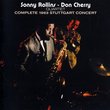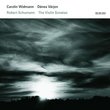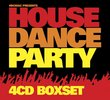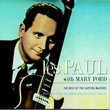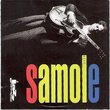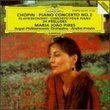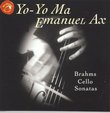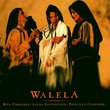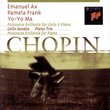| All Artists: Ludwig van Beethoven, András Schiff Title: Beethoven: The Piano Sonatas, Vol. 7 Members Wishing: 1 Total Copies: 0 Label: ECM Records Original Release Date: 1/1/2008 Re-Release Date: 9/30/2008 Genre: Classical Styles: Chamber Music, Forms & Genres, Sonatas, Historical Periods, Classical (c.1770-1830), Romantic (c.1820-1910) Number of Discs: 1 SwapaCD Credits: 1 UPC: 028947661894 |
Search - Ludwig van Beethoven, András Schiff :: Beethoven: The Piano Sonatas, Vol. 7
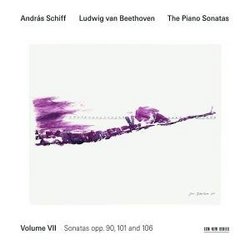 | Ludwig van Beethoven, András Schiff Beethoven: The Piano Sonatas, Vol. 7 Genre: Classical
The seventh volume, and penultimate release in Schiff's highly acclaimed and hugely popular series of Beethoven sonatas is here. Part VII, recorded once again live at Tonhalle Zurich, includes the first three of the so-cal... more » |
Larger Image |
CD DetailsSynopsis
Album Description The seventh volume, and penultimate release in Schiff's highly acclaimed and hugely popular series of Beethoven sonatas is here. Part VII, recorded once again live at Tonhalle Zurich, includes the first three of the so-called "late" sonatas which were written between 1814 and 1822. Similar CDs
Similarly Requested CDs
|
CD ReviewsPenultimate perfection Prescott Cunningham Moore | 10/08/2008 (5 out of 5 stars) "This is by far Schiff's greatest achievement in the cycle to date. Every single one of previous six installments offered uneven performances. On the lower end of the spectrum sit Schiff's interpretations of the opus 2 set, conceived on an overly broad and lyrical scale. Schiff missed the joy of opus 10/2. The second movement of opus 78 was absolutely devoid of the requisite humor necessary to pull off the work. And opus 31/3 received a particularly wooden performance. On the other hand, Schiff's opus 13 was not only the highlight of the second installment of the cycle, but is also one of the most convincing interpretations of the Pathetique on disc. Like his interpretation of the Pathetique, Schiff's conception of opus 57 eschews the hysteria of so many performances by focusing on the great architecture of the Appassionata. Schiff's finger work in the finales of opus 10/1, opus 27/2, and opus 81a is simply astounding. But none of the previous recitals offered a simultaneously enjoyable listening experience coupled with equally successful interpretations ... until now. It is almost a shame that Schiff did not have such a stunning recital until his penultimate installment, but the performance is so wonderful and winning that I can forgive the relative unevenness of his previous outings. Right from the opening chords of opus 90, the performance is perfect. Schiff captures the mercurial autumnal shifts within the first movement, quickly moving from power declamations to gentle song. He so perfectly captures the chamber-music effects of the music, all the while perfectly projecting the music's emotionalism. The second movement, which many performers have difficultly relating to the previous movement, flows naturally and beautifully out of the first. Schiff's tempo perfectly captures the music's song-like character. Schiff's playing, which is often prone to moments of preciousness, fully captures the idiomatic character of the music. Opus 101 is, if anything, even more astounding. Schiff's lightness of touch and extraordinary technique serves the opening movement better than nearly any other performance. The movement, just shy of four minutes, comes and goes as quietly as a dream. The reading is simply stunning. From the quiet of the first movement comes Schiff's appropriately humorous and rollicking march. It is nice to hear Schiff playing into Beethoven's humor rather than against it. The effect is delightful, Schiff capturing the binary between unbridled energy and sublimated anger perfectly. At the close of the sublime third movement, the ghost of the allegretto is absolutely chilling, Schiff expertly capturing its dual function as both a unifying and transitional force. As an expert counterpuntalist, Schiff's finale is miraculous. The voices in the fugue are all clearly delineated and are dispatched perfectly. And the close of the sonata, with its hushed beauty, is worth the price of the disc alone. Schiff's opus 106 may not be the most "hammery" Hammerklavier on disc, but on the whole, it is certainly one of the better overall conceptions of the work on disc. That is not to say that Schiff does not instill both outer movements with the requisite drama. But it is never drama for drama's sake. Rather, it all fits in within Schiff's no-nonsense approach to the sonata. The first movement is briskly paced, but faithfully pits Beethoven's huge orchestral outbursts against moments of lyrical introspection. The scherzo is lovely - although the large run before the return of the scherzo sounds a tad self-conscious. At slightly over 15 minutes, Schiff does not draw out maudlin sentimentality from the f-sharp minor adagio; rather his conception of the movement is much more powerful and strong-willed than many. Schiff highlights the violent contracts of mood quite effectively while never loosing sight of the structural arch of the movement. While it could be argued that Schiff begins the finale in a bit of a perfunctory manner, his approach is appropriate as an outgrowth of the adagio. Of course, Schiff's handling of the fugue is astounding; rarely has the finale sounded less clogged than it does in Schiff's hands. Although I always thought Schiff's intellectualism harmed his readings of Beethoven's overt earlier works, his highly sensitive genius serves the late sonatas perfectly. His delicacy of touch creates some magically otherworldly effects, while his fortes are full-bodied, powerful, and exciting. Furthermore, the sound of the piano in this installment is beautiful. It seems ECM has, in this seventh outing, finally learned how to capture the bright timbre of Schiff's instruments in the Tonhalle. The reverberations create the effect of the concert hall while never sounding cavernous. The upper registers never sound brittle, as they were prone to do in the previous installments. All in all, what a wonderful disc that will please any Beethoven connoisseur and will come as a pleasant and welcome surprise to all who have been collecting the sonatas to date. With only the last three sonatas left to be released, I hope Schiff can duplicate his efforts here. If so, Schiff's cycle, while perhaps not definitive, will certainly go down as one of the better and certainly one of the most fascinating cycles in the history of the sonatas." András Schiff defines Beethoven's piano sonatas Scaffa | Sweden | 01/05/2009 (5 out of 5 stars) "This review refers to the eight volumes of András Schiff's cycle of Beethoven's piano sonatas released by ECM Records. The lay out of the volumes is as follows: Vol 1: opp. 2 and 7 Vol 2: opp. 10 and 13 Vol 3: opp. 49, 14 and 22 Vol 4: opp. 26, 27 and 28 Vol 5: opp. 31 and 53 Vol 6: opp. 54, 57, 78, 79 and 81a Vol 7: opp. 90, 101 and 106 Vol 8: opp. 109, 110 and 111 All recordings except those on the last volume are of live performances (from 2004 to 2006) in the Tonhalle Zurich in front of a very quiet audience. No coughing between movements, no applause at the end, and hardly any noise at all during performances. The last volume was recorded in the empty hall of the Reitstadel in Neumarkt, Germany. The sound quality is superb throughout. The separation of the channels is done so that you have the higher notes, located on the right hand side of the keyboard, in the right channel, and the lower notes in the left channel. Personally I find this the only acceptable way of organising piano music into a stereo recording. It gives you the impression of sitting in with the pianist. Schiff's performances are of the highest order. He even manages to breathe new life into often-heard sonatas such as the Op 27-2, Moonlight. Pianists have not been able to agree on how to interpret Beethoven's instructions for the first movement of the Moonlight. Some, including Schiff, take Beethoven literally and push down the pedal for the entire movement (this and many other things is explained by Schiff in his Wigmore Hall lectures which are available for free download from the Guardian website). Gulda did the same in his 1950s cycle but not in his 1960s cycle. The result is mesmerising and beautiful. In addition, Schiff plays the Moonlight sonata at a slightly faster speed than what is commonly done, which makes for a fresh and contemporary take on this well-known piece. No single cycle will probably satisfy you completely. I find much of Barenboim's playing on his 1960s cycle very odd but his performance of the Hammerklavier would follow me to a desert island. Gulda's 1960s cycle is mostly excellent (as is the sound, but one has to accentuate 'mostly' here because there are some awkward splices) but I can't think of any better way of starting your exploration of these magnificent works than by listening to Schiff's cycle. He has a sublime touch, a masterly control over his means and an artistic sensibility that will convince you that this is how Beethoven should be played. And it's all rendered in glorious sound. Highly recommendable. " A Rip-Roaring Hammerklavier Dmitry Portnoy | Studio City, CA United States | 04/02/2009 (5 out of 5 stars) "I have been following Andras Schiff's Beethoven sonata cycle both on CD and in live performances at the Disney Hall in LA. I found his performances of the early and middle period sonatas to be challenging and rewarding. Schiff's precision fingering and pedaling achieved a striking textural transparency, and his phrasing, color, and what I'd like to call tactility (a willingness to use the full spectrum of the piano sound, from percussive-orchestral to intimate-vocal) illuminated the structure and emotion of the music, without once becoming mannered or didactic: as a performer, he had no agenda except a passionate commitment to the score. As a listener, I welcomed all of his discoveries, which sometimes included entire sonatas I had been previously indifferent to (for example, the middle ones in Op. 2 and Op. 10,) but for me his approach reached its peak in his shockingly alien, yet utterly convincing take on the "Moonlight." Afterward, the going got a little rough in spots: listening to the "Appasionata" and the "Waldstein," I sometimes lost sight of the overall flow of the music amidst the cascade of detail. However, the nervous energy and emotionalism of "Les Adieux" made it my favorite performance of that sonata to date.
Which brought me a year and a half later to the recital that included Op. 90, Op. 101, and Op. 106. Here all my little observations go out the window. "Challenging and rewarding" are replaced by "revelatory and overwhelming." Sure, here and there you can quibble with details: for example, the color contrast in the opening bars of Op. 90 may be a trifle much. But nobody better conveys the moods of that sonata. And nobody has ever made the tiny slow movement of Op. 101 this profound. And then one comes to the "Hammerklavier." In the live recital, Schiff performed the works without intermission, launching into the thundering opening chords of Op. 106 while the applause for Op. 101 was peaking. The effect was electric. It brought down the house. And it was completely appropriate. The "Hammerklavier" stops everything. It intrudes. It takes over. And Schiff's performance fully embodies that spirit. The opening movement was filled with passion, energy and wild abandon, without losing any of the clarity and insight of the performances of earlier sonatas. The second movement, which often comes off as clunky or sarcastic, was tender, emotional and light, while staying in true scherzo character. The slow movement presented an unbroken narrative thread of continuously developing feeling. And the finale was triumphant and virtuosic, as well as musical and pianistic. Every detail, every individual choice, disappeared into the whole. The pianist disappeared into the performance. And I disappeared into the music. What a time to peak. This is my favorite "Hammerklavier" on record." |

 Track Listings (10) - Disc #1
Track Listings (10) - Disc #1